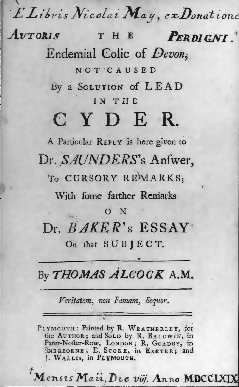Thomas Alcock (priest) facts for kids
Quick facts for kids
Thomas Alcock
|
|
|---|---|
| Born | 1709 |
| Died | 24 August 1798 Runcorn, Cheshire, England
|
| Education | Warrington School Brasenose College, Oxford |
| Occupation | Clergyman |
| Title | Reverend |
| Spouse(s) | Mary Harwood |
Thomas Alcock (1709 – 24 August 1798) was a clergyman in the Church of England. This means he was a religious leader. He was also an author and held more than one church job at the same time.
Contents
Early Life and Education
Thomas Alcock was born in 1709 in a place called Aston, near Runcorn in Cheshire, England. He was the third son of David and Mary Alcock. His father, David, was related to Bishop John Alcock, who started Jesus College, Cambridge.
Thomas went to Boteler Grammar School in Warrington. Later, he studied at Brasenose College, Oxford, starting in 1728. He earned his first degree in 1731 and a master's degree in 1741.
His Work as a Clergyman
Thomas Alcock started his church work as a curate (a helper to the main priest) in Stonehouse, Plymouth, in 1731. A year later, he also began working as a minister in a nearby area called St Budeaux.
In 1756, he became the vicar (the main priest) of Runcorn. He managed both parishes, often using other curates to help him. He was also a Justice of the Peace in Cheshire, which meant he helped keep law and order. However, he spent most of his time in Devon and only returned to Runcorn later in his life.
Helping the Community
Thomas Alcock became very popular in the areas where he worked. People liked him because he sometimes chose not to collect tithes. Tithes were like taxes paid to the church.
He was also known for his unusual habits and simple lifestyle. He was very kind to people who were poor. He even helped them as a doctor and a lawyer, offering advice and care.
In 1769, Thomas Alcock hoped to become the vicar of another church, St Andrew in Plymouth. But he was not chosen for the job. After this, he refused to preach his usual sermon there or even go inside that church again.
In 1771, he helped buy land to support a charity school in Weston Peverel. This school helped teach children and provided clothes for poor people. In 1769, he was given the "freedom of the borough" of Plymouth, which was a special honor.
Farmer and Cidermaker
Thomas Alcock also worked as a farmer at a place called Ernesettle. He even called himself "A Cydermaker." He spoke out against a tax on cider, and this tax was removed in 1766.
Some people thought that a serious stomach illness, common in Devon, was caused by lead poisoning from the equipment used to make cider. Thomas Alcock disagreed. He argued that the illness was only caused by small lead pellets used to clean cider bottles, not the cider itself.
Family Life and Later Years
Thomas Alcock married Mary Harwood from Ernesettle, Plymouth. Through his marriage, he gained a lot of property in the area. They did not have any children, and Mary passed away in 1777.
When he was 78 years old, Thomas Alcock married again. He then moved back to Runcorn, where he died in 1798. He left behind a significant amount of money and property.
After his brother Nathan died in 1779, Thomas wrote a book called Some Memoirs of the Life of Dr Nathan. In 1796, he also helped publish another of Nathan's books, The Rise of Mahomet, Accounted for on Natural and Civil Principles.
 | Tommie Smith |
 | Simone Manuel |
 | Shani Davis |
 | Simone Biles |
 | Alice Coachman |


